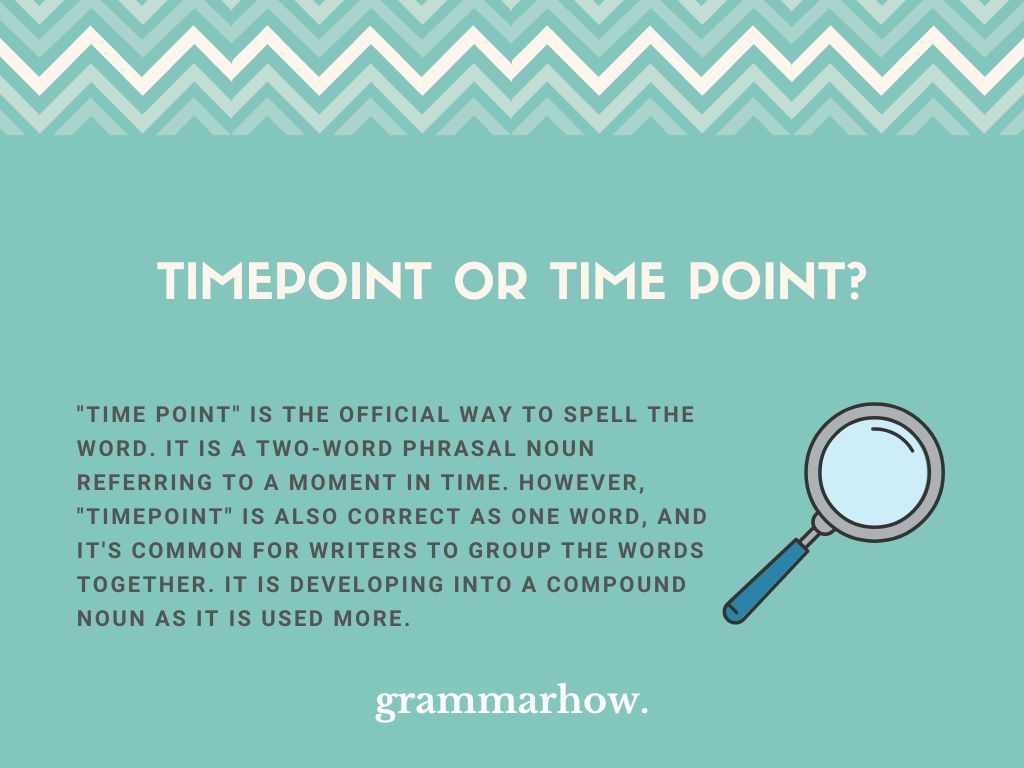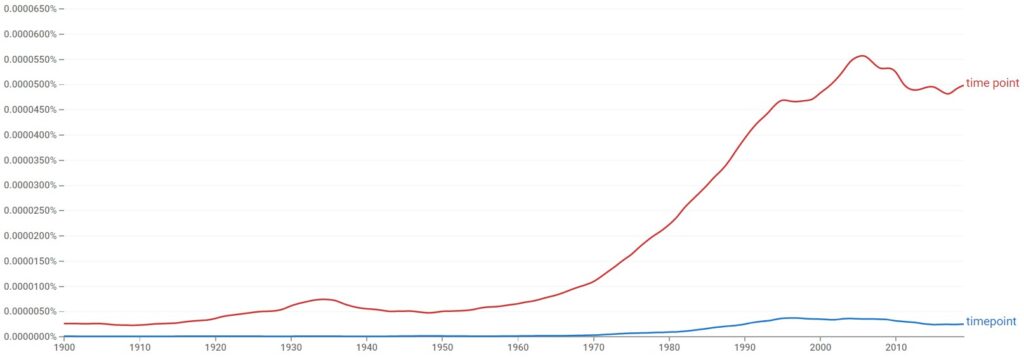Did you know that the English language is constantly evolving? Every day, new ideas and concepts are put forward, and it’s only a matter of time before those ideas stick. This article will explore the differences between “time point” and “timepoint” when writing them as one or two words.
Timepoint or Time point?
“Time point” is the official way to spell the word. It is a two-word phrasal noun referring to a moment in time. However, “timepoint” is also correct as one word, and it’s common for writers to group the words together. It is developing into a compound noun as it is used more.

According to Google Ngram Viewer, “time point” is correct as it’s the most popular choice of the two. However, you may also notice that “timepoint” has recently gained traction and popularity.

You might find that both options become officially correct soon. It’s possible for compound words like this to come about when people are more familiar with them.
You could also refer to The Oxford Dictionary to find an entry for “time point.” It is only written as two words here, implying that the one-word option still isn’t officially recognized.
Is “Timepoint” One Word?
“Timepoint” isn’t officially recognized as one word, but that could change soon. It seems probable because there are plenty of online entries for both “timepoint” and “time point,” suggesting that both spellings are correct.
“Timepoint” is used to refer to a moment in time. It’s most common in computing, but you will find it in any situation where time can be measured. You can spell it as one word if you think it suits the sentence better.
The interesting thing about this word is that “timepoint” is a compound noun that seems to be developing as we talk about it. In a few years, it may well be the most popular choice of the two options, making the two-word variation obsolete.
Here are some examples to show you how to use “timepoint” in a sentence:
- I’m going to need you to revisit the timepoint. I want to make sure things are working correctly.
- What timepoint did you say they were doing this at? Is there any way we can address the issue?
- I’m not sure about the timepoint right now. I need to verify it with a few of the other groups.
- I need them to meet at the same timepoint. Can you orchestrate it to make it happen?
Technically speaking, “timepoint” is not officially correct. It is not grammatical as one word (yet).
Is “Time point” Two Words?
“Time point” is the correct way to spell the words, according to most official English dictionaries. You should always write it as two words if you want to follow the grammatical rules associated with the phrase.
Eventually, this won’t be the case. The one-word option will likely be the most popular choice. However, this is yet to occur, so it’s best to stick to the formal rules.
Here are a few examples to show you how to use “time point” in a sentence:
- I’m going to refer you to the time point that I had in mind. I think it’s wise to stick to the script here.
- What time point do you want me to work toward? I will try my best to figure out a solution.
- Those time points are no good right now. You’ve got to find a way to stop them from going forward.
- I’m sorry, but what’s the point of the time points you’ve provided? They’re not helping us at all.
Tip to Remember the Difference
It would be useful to have a tip to remember the two-word variation as the correct phrase. Even if it’s liable to change, it’s still the best form right now.
“Time point” should be written as two words. It is grammatically correct to do this, and you should remember that “time” modifies “point” to show that it’s a specific point in time when writing about it. That’s why the two-word variation is correct.
Final Thoughts
You may use either “time point” or “timepoint.” If you want to follow formal and grammatical rules, it’s best to use “time point” as two words to show that you fully understand English rules. “Timepoint” is only one word informally, though it could become more formal in the future.

Martin holds a Master’s degree in Finance and International Business. He has six years of experience in professional communication with clients, executives, and colleagues. Furthermore, he has teaching experience from Aarhus University. Martin has been featured as an expert in communication and teaching on Forbes and Shopify. Read more about Martin here.

